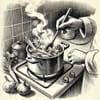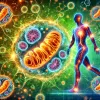Welcome back to our regular feature where we sift through thousands of new, health-related papers, and pick a few to summarize in a practical and not anxiety-inducing way.
Our main questions on each paper:
- In simple language, what does it say?
- Does it have good evidence?
- Should what it says matter to normal people?
- What simple thing, if anything, could a normal person do to take advantage of this finding?
Okay, away we go. And, as always, we rate each paper for practicality and level of interest.
This edition's articles and papers:
- The Case Against an Annual Physical https://www.wsj.com/health/wellness/annual-physical-exam-health-needs-4cbacdac
- Tension in the ranks: Cooperative cell contractions drive force-dependent collagen assembly in human fibroblast culture - ScienceDirect https://www.sciencedirect.com/science/article/pii/S25902385240002
- Improving sarcopenia in older adults: a systematic review and meta-analysis of randomized controlled trials of whey protein supplementation with or without resistance training - ScienceDirect https://www.sciencedirect.com/science/article/pii/S127977072400263X?via%3Dihub
- Do Exercise-Based Prevention Programs Reduce Injury in Endurance Runners? A Systematic Review and Meta-Analysis - PubMed https://pubmed.ncbi.nlm.nih.gov/38261240/
Paper 1: Annual Checkups Questioned
Practicality (5/5): 🏃♂️🏃♂️🏃♂️🏃♂️🏃♂️
Interest (5/5): 🏃♂️🏃♂️🏃♂️🏃♂️🏃♂️
Summary
The necessity of yearly physical exams is increasingly being debated, with many medical professionals arguing, based on data, that young, healthy individuals may not need them. Health professionals are shifting the focus from traditional physical assessments to discussing lifestyle habits and using pre-appointment questionnaires and technology. Meanwhile, the shortage of primary-care doctors and some patients' choice of alternative care options highlight changes in how routine health maintenance is approached.
What is the paper or article's main claim?
- The utility of annual physical exams is context-dependent, and the approach to routine health visits is evolving.
Are the methods and/or data it uses appropriate and convincing?
- The article references studies and expert opinions but does not detail specific methods, making it hard to judge their robustness.
What do we know now that we didn't know before, if anything?
- It appears that the traditional annual physical exam is less beneficial for younger, healthy people, and there's a shift towards personalized health goals and lifestyle discussions during checkups.
What simple and practical thing could a normal person do knowing this?
- Individuals might opt to focus more on lifestyle changes and less on yearly physicals if they are young and healthy, but should still adhere to recommended preventive screenings.
- Mass screening of asymptomatic and otherwise healthy individuals is being show to be increasingly problematic
Paper 2: Whey Protein and Sarcopenia
Practicality (5/5): * 🏃♂️🏃♂️🏃♂️🏃♂️🏃♂️
Interest (5/5): * 🏃♂️🏃♂️🏃♂️🏃♂️🏃♂️
Summary
The study examined the impact of whey protein supplements on older adults with sarcopenia, a condition of muscle loss due to aging. It was found that whey protein improved muscle mass and walking speed, while resistance training combined with whey protein increased grip strength. Whey protein also reduced inflammation, increased helpful growth factors, and did not lead to unwanted weight gain.
What is the paper's main claim?
- Whey protein improves muscle mass and physical function in older adults with muscle loss.
Are the methods and/or data it uses appropriate and convincing?
- Randomized controlled trials (RCTs) were used, which are reliable methods to study the effects of interventions.
What do we know now that we didn't know before, if anything?
- Consuming whey protein can help older adults with sarcopenia gain muscle mass, walk faster, and increase overall energy and protein intake without gaining unwanted fat.
What simple and practical thing could a normal person do knowing this?
- Older adults experiencing muscle loss might consider adding whey protein to their diet, possibly in combination with moderate resistance training, to improve muscle health.
- In general, most people get too little protein, and this becomes even more problematic with increasing age
Paper 3: Tissue Formation Mechanics
Practicality (3/5): * 🏃♂️🏃♂️🏃♂️
Interest (4/5): * 🏃♂️🏃♂️🏃♂️🏃♂️
Summary
Scientists have found that certain movements by cells called "pulls" can organize and create durable animal tissue structures. These pulls generate tension that aligns and structures key building block proteins into strong, elongated shapes. This new understanding of how tissues form could change how we think about tissue repair and diseases affecting connective tissue.
What is the paper's main claim?
- The study suggests that mechanical actions of cells, specifically tension-creating "pulls," are fundamental in organizing and shaping the structure of durable tissues in animals.
Are the methods and/or data it uses appropriate and convincing?
- The researchers used high-resolution microscopy to observe and categorize cells' pulling actions, validating their observation that tension directly leads to the assembly of structural proteins into organized tissue.
What do we know now that we didn't know before, if anything?
- We now understand that mechanical forces, exerted by cell movements or "pulls," play a direct role in guiding the formation of structural proteins into functional tissue, challenging previous models that didn't fully consider tension as a driving force.
What simple and practical thing could a normal person do knowing this?
- Given the new insights, individuals interested in tissue health could focus on activities that promote mechanical tension in tissues, such as specific exercises, to possibly improve or preserve tissue strength and functionality.
- We should also be more cautious about orthopedic therapies and procedures that are not explicitly predicated on this new knowledge
Paper 4: Injury Prevention for Runners
Practicality (5/5): * 🏃♂️🏃♂️🏃♂️🏃♂️🏃♂️
Interest (4/5): * 🏃♂️🏃♂️🏃♂️🏃♂️
Summary
The review examined whether exercise programs help endurance runners avoid injuries. It found that, generally, these programs don't decrease injury risk or rate, but programs with professional supervision showed a significant reduction in injuries. However, most of the reviewed studies had low-quality design, indicating a need for better-constructed research in the future.
What is the paper's main claim?
- Exercise routines don't typically reduce injuries for runners unless they are supervised.
Are the methods and/or data it uses appropriate and convincing?
- The study used a thorough approach but lacked high-quality evidence, pointing to a need for more rigorous research.
What do we know now that we didn't know before, if anything?
- Supervision might be key in making injury prevention programs effective for runners.
What simple and practical thing could a normal person do knowing this?
- Consider supervised training or coaching to potentially lower the risk of running-related injuries
We will be back with more papers next week. And if you see a paper that is getting attention, and you wonder if you should care, let us know.





